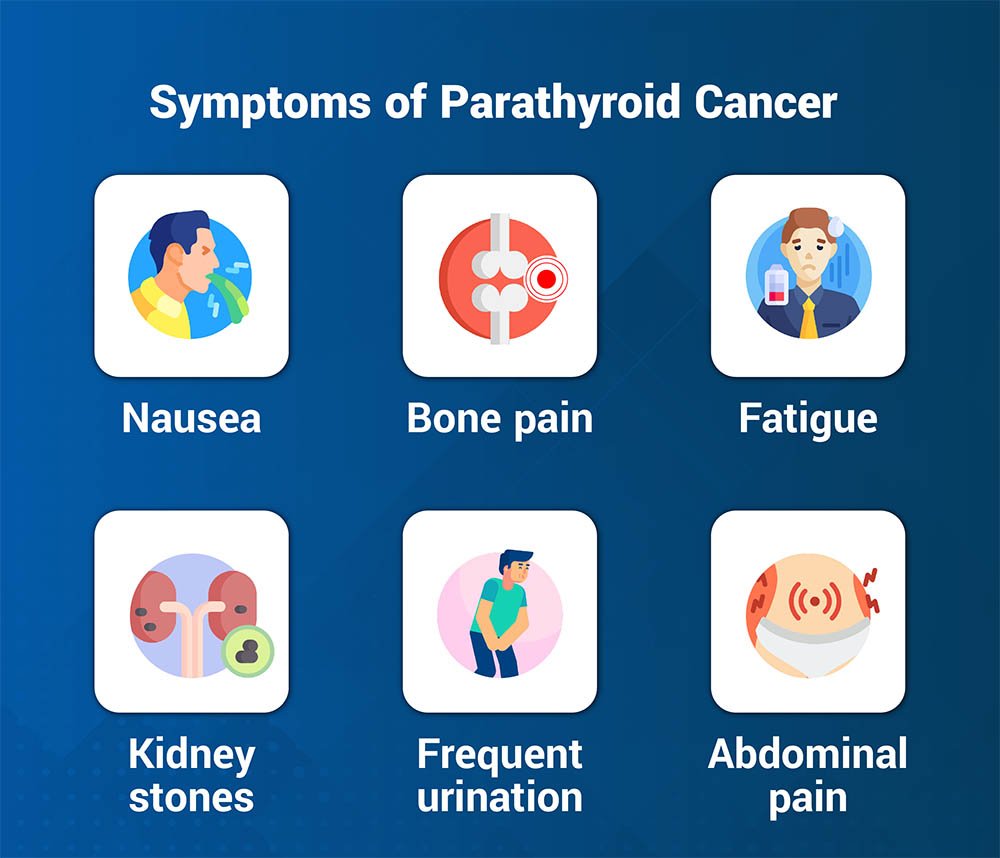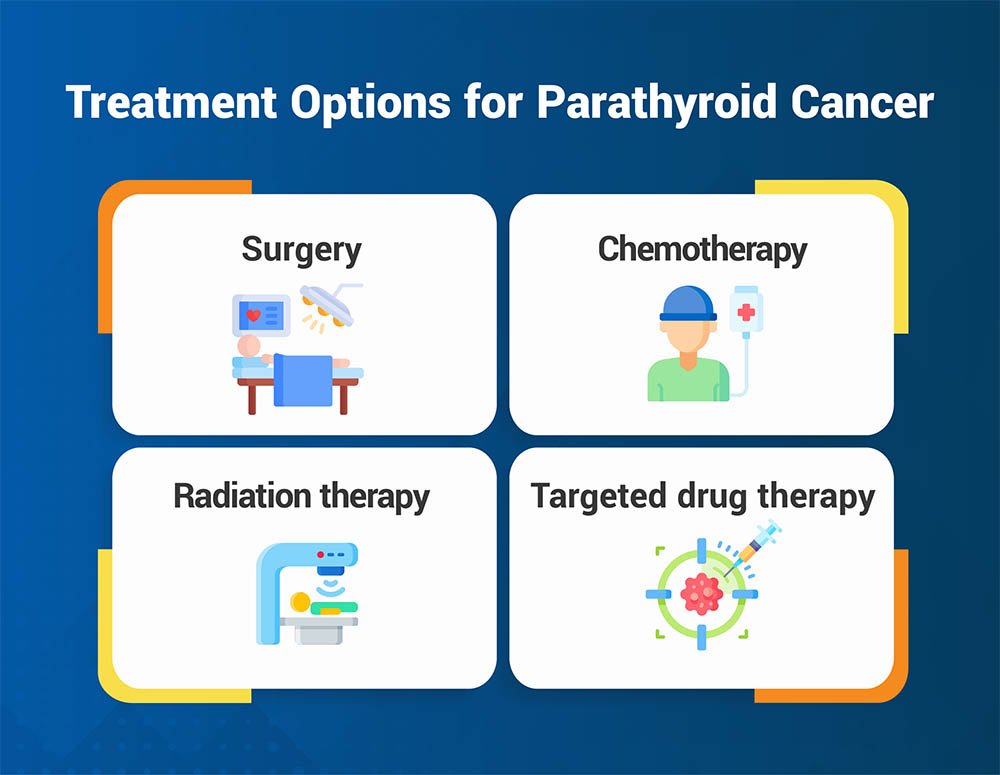The parathyroid glands are small endocrine glands located in the neck, behind the thyroid gland. These glands produce and regulate parathyroid hormone (PTH), a hormone that maintains calcium balance in the body. Also known as parathyroid carcinoma, parathyroid cancer occurs when abnormal cells in the glands grow rapidly, eventually forming tumors. This cancer is rare and accounts for less than 1% of all cases of primary hyperparathyroidism – a condition characterized by excessive production of PTH.
In this blog post, we will share insights into the risk factors, symptoms, and treatment of parathyroid cancer to provide a detailed idea about the disease. Read on to learn more.
Table of Contents
Risk Factors for Parathyroid Cancer
Although there are no definite known causes of parathyroid cancer, a few factors may increase its risk. Read on to learn about the factors:
- Genetic mutations
In some cases, specific genetic mutations, such as multiple endocrine neoplasia type 1 (MEN1) syndrome may increase the risk of developing this cancer.
- Radiation exposure
A history of exposure to radiation, particularly individuals who have received high-dose radiation therapy for other cancers in the head and neck region, may develop this disease.
- Family history
Individuals with a family history of parathyroid cancer or other endocrine-related tumors, such as tumors of the thyroid or adrenal glands, are at an increased risk.
- Age
Parathyroid cancer can happen at any age, but it is more prevalent in those aged between 30 and 60.
- Prior parathyroid conditions
Certain benign parathyroid conditions, such as primary hyperparathyroidism or benign parathyroid adenomas, may increase the likelihood of contracting this disease. However, most people with these conditions do not develop cancer in their lifetime.
Individuals with one or more of these risk factors will not necessarily develop parathyroid cancer. Similarly, those with no known risk factors can also develop this disease. If you have concerns about whether you may be at risk for parathyroid cancer, consult a healthcare professional for personalized guidance and appropriate screening or monitoring.
Symptoms of Parathyroid Cancer

The symptoms may vary from person to person, and some individuals may not experience any symptoms at all, especially in the early stages. However, common symptoms to watch out for are as follows:
- Bone pain
Hypercalcemia can cause bone pain, which can be localized or widespread, affecting various parts of the body.
- Kidney stones
Elevated calcium levels in the urine can increase the risk of kidney stones, leading to symptoms such as flank pain and recurrent urinary tract infections.
- Frequent urination
Increased urine production can occur due to the effect of high calcium levels on the kidneys.
- Abdominal pain
Although not common in most cases, some individuals may experience abdominal pain.
- Nausea and vomiting
Hypercalcemia can have an adverse effect on the digestive system and result in symptoms like nausea, vomiting, and decreased appetite.
- Weakness and fatigue
Excessive calcium levels can affect muscle function and lead to weakness and fatigue.
These symptoms are not exclusive to parathyroid cancer and can indicate other health conditions. Individuals experiencing persistent or worsening symptoms should consult a physician immediately for a proper evaluation and diagnosis.
Treatment Options for Parathyroid Cancer

1. Surgery
Surgical intervention is the primary treatment option for parathyroid cancer. The extent of the surgery depends on the stage and location of the cancer. The following are some common surgical procedures used in treating this rare form of cancer:
- En Bloc Resection
In this surgical technique, surgeons remove the tumor along with the affected parathyroid gland(s) and adjacent tissues, such as the thyroid gland, lymph nodes, etc. Oncologists typically recommend it for localized parathyroid cancers.
- Thyroidectomy
In cases where parathyroid cancer is associated with coexisting thyroid cancer or when the thyroid gland is at risk, surgeons may perform a total or near-total thyroidectomy. In this procedure, surgeons remove all or a portion of the thyroid gland.
- Regional Lymphadenectomy
If the cancer has spread to nearby lymph nodes, surgeons may perform a lymphadenectomy to remove the affected lymph nodes.
2. Radiation therapy
Oncologists may use radiation therapy as a post-surgery treatment option to destroy any remaining cancer cells or to shrink tumors that are impossible to remove surgically. There are two types of radiotherapy commonly used for parathyroid cancer, which are as follows:
- External beam radiation therapy
This type of radiation therapy for cancer involves targeting high-energy beams from an external machine to the affected area, including the surgical site or regional lymph nodes.
- Adjuvant radiation therapy
Radiation oncologists may consider administering this radiation therapy after surgery to reduce the risk of recurrence. They may also use it in cases when there is a high likelihood of residual microscopic disease.
3. Chemotherapy
Oncologists do not consider chemotherapy a standard treatment for parathyroid cancer since it’s a rare malignancy where the affected cells typically do not respond well to conventional chemotherapy drugs.
However, in the cases where cancer has metastasized and spread to distant organs or if the tumor cannot be completely removed by surgery, chemotherapy may be used in combination with other treatments, as part of a multimodal treatment approach.
4. Targeted drug therapy
For the treatment of parathyroid cancer, targeted therapy medications are recommended to control the excessive production of parathyroid hormone (PTH).
The treatment options vary largely depending on individual cases. Therefore, it is crucial to contact a cancer center and consult a team of cancer care specialists. Contact ACTC, one of the best cancer treatment centers in Florida, providing the best cancer care with personalized cancer treatment plans.
Supportive Care
In addition to these primary treatment options, healthcare professionals may also recommend the following supportive care measures to manage symptoms and improve overall well-being:
- Calcium and vitamin D management
Since parathyroid cancer disrupts calcium regulation, supplements or medications may be prescribed to maintain appropriate calcium and vitamin D levels in the body.
- Symptom management
Oncologists may also prescribe specific medications to alleviate symptoms like bone pain, nausea, or depression.
- Follow-up care
Regular follow-up visits are a crucial part of reducing the risk of recurrence. Follow-up visits will help the providers monitor individual health conditions, including blood tests to assess calcium and hormone levels. Oncologists may also recommend imaging studies to detect any signs of recurrence or metastasis.
Coping Strategies
Coping with a cancer diagnosis and the side effects of the treatments can be difficult. Talk to friends, family, or join support groups who can provide understanding and empathy. Empower yourself with knowledge about parathyroid cancer, its treatments, and potential side effects to make informed decisions at every stage of the treatment. Additionally, it is crucial to maintain open and honest communication with the healthcare team. Ask questions, express concerns, and discuss the treatment options. Focus on maintaining a balanced diet, practicing regular exercise, and getting sufficient sleep. A comprehensive approach can make the journey easier both physically and mentally.
Summing Up
Since the exact cause of parathyroid cancer is still unknown, prevention may not be entirely possible. Therefore, it is crucial to get regular screenings and checkups done and seek medical attention if any concerning symptoms or changes occur. Focus on following a balanced diet, exercise regularly, and maintaining a healthy lifestyle to ensure optimal health and well-being.










